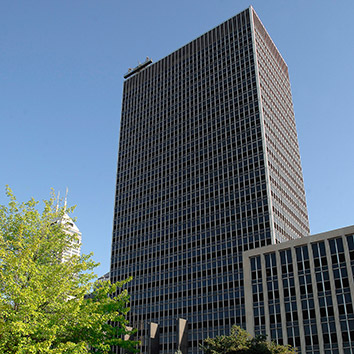Subscriber Benefit
As a subscriber you can listen to articles at work, in the car, or while you work out. Subscribe NowThe Indianapolis City-County Council on Monday passed a proposal to temporarily limit fees charged by third-party delivery services to restaurants during certain public health emergencies.
The measure, which was introduced Feb. 22, passed by a vote of 20-5.
Proposal 106, co-authored by councilors Keith Potts, D-District 2, and John Barth, D-District 7, applies to periods when dining capacity is limited by orders from county or state health authorities, and for 90 days after the expiration of the order.
The measure limits total fees to no more than 20% of a meal’s price. It also prohibits third-party delivery services from attempting to make up lost fees by passing costs on to drivers or customers.
Delivery services could face citations of up to $500 for charging more than the outlined amount.
The proposal was originally intended only for the current COVID-19 pandemic, but it was amended by the council to include future health emergencies.
UberEats, GrubHub and DoorDash are among the companies that will have comply with the new rule if they aren’t already.
Barth and Potts said some services were charging as much as 30% to 40% of a meal’s price for delivery, causing restaurants to lose money on their transactions.
Local restaurants have seen delivery orders skyrocket over the past year because of the pandemic.
Proposal 106 “puts basic, temporary protections in place to ensure local restaurateurs, workers, and drivers keep more of their earnings while making sure customers keep getting the same value they’ve always received from Indy businesses,” Potts said in written comments.
Republican council members Brian Mowery, Michael Paul Hart, Joshua Bain, Paul Annee and Michael Dilk voted against the proposal. Mowery, the minority leader, said the council could do more for businesses and restaurants by lessening “regulations and red tape” and letting restaurants open at full capacity instead of at 75% under county health mandates.
Please enable JavaScript to view this content.


A useful Republican idea would have been to offer a competing bill or amendment that would drop the hammer on services that offer delivery without the permission of the local restaurant, in some cases despite being told to stop.
There are horror stories everywhere of Doordash and Ubereats hosing orders and screwing customers, who take their anger out on the restaurants.
Instead, Republicans just toss out some conservative talking points for their voters who must be playing bingo at home. (“Did you have red tape?” “No, I had fraud and waste”)
Joe Elsener, you have a lot of work to do. The Marion County GOP is just the party of “no”.
https://twitter.com/BigLugCanteen/status/1359654056101367812
Government ordered price controls, why not drop it to 10%? Oh, and pay the drivers a guaranteed minimum wage of $30, finance it with stimmy checks. Then give everyone the week off.
Oh my, the horror of government instituting an anti-gouging measure during a global pandemic that has devastated the restaurant industry! If the big corporate delivery apps are unhappy with only taking a 20% cut off a sale, they are free to not offer their service and go elsewhere. Of course, many jurisdictions across the country have implemented similar caps on delivery fees, and the big delivery apps have been doing just fine and continue to offer their services.
Do we really need more legislation or can the free market deal with this? If the fee is disclosed upfront then I do not understand why there is a problem. One can always say no – I am not paying that much for the service. I must be missing something here. It just seems that all too often we use government to try and make things perfect when usually competition and common sense could prevail …
Except there very little competition with big corporate delivery apps, and they have been taking advantage of the global pandemic to gouge already suffering restaurants. Government can and should step in when big players abuse their market position and the circumstances related to a natural disaster to squeeze small business and threaten their Ling-term viability.
The delivery services have been very aggressive and few independents are able to absorb those costs. What business model can operate while giving up 30%-40%?
At least the city council is trying to protect an industry that has been absolutely devastated.
then open up to 100% capacity and problem solved.
The problem is the virus, not the restrictions. Restaurants (and Indianapolis) were in trouble even if we had no restrictions.
For example … if we had no restrictions on downtown restaurants and businesses, how many would still be hurting because all the convention traffic that would have gone away, and the number of businesses that would have still kept their workers home?
If you want to solve the problem, get vaccinated when it’s your turn, stay home as much as you can, and wear a mask when you go out. The end of all this is in sight if people can just be patient and be smart a couple more months.